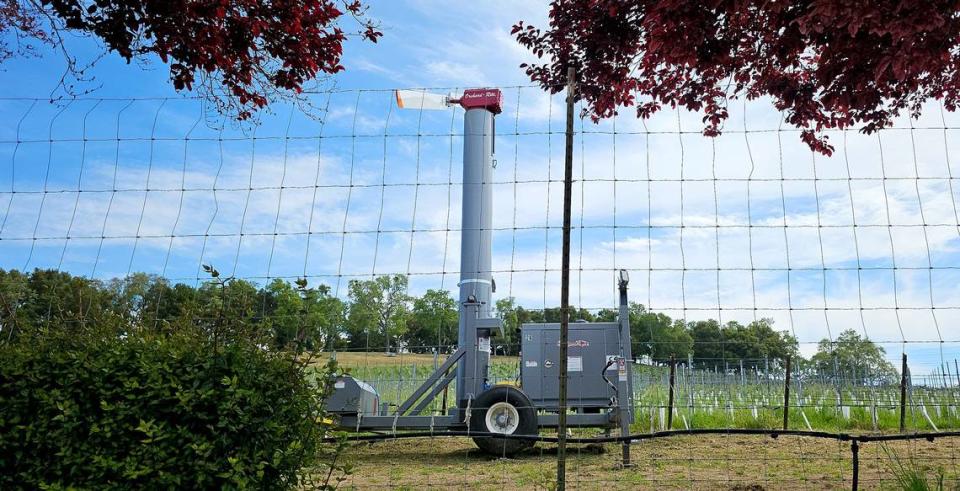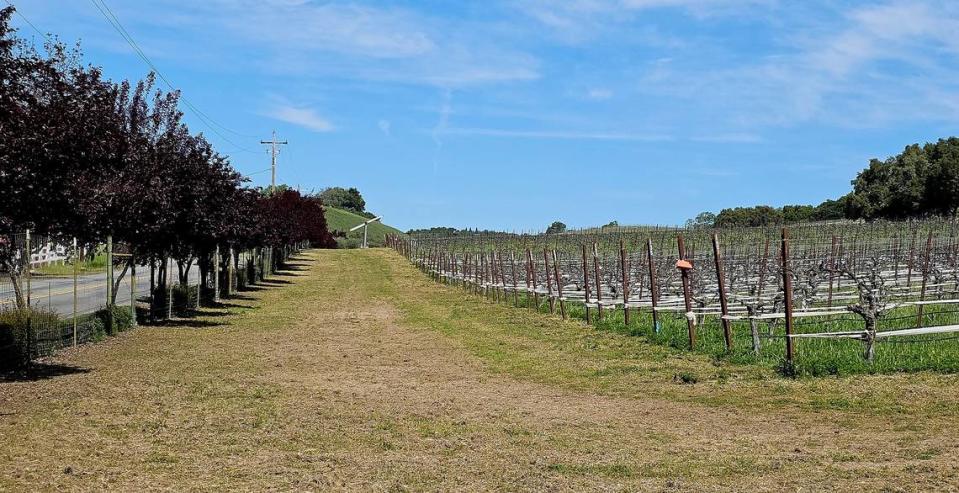They sound like ‘Vietnam-era choppers.’ Should these noisy farm machines be muzzled? | Opinion
You can’t miss Claire Mamakos’ farm stand on picturesque Vineyard Drive in rural San Luis Obispo County.
It’s the whimsical one with the flowers, the wind chimes and the hand-painted signs. It’s where Mamakos sells fruit, honey, eggs, walnuts and CBD salve.
The farm is located in the heart of Paso Robles wine country — one of the top wine region’s in the nation — directly across the road from Jada Vineyard, an upscale winery and tasting room.
Therein lies the problem.
For the past couple of years, Mamakos has been tilting — not at a windmill — but at a wind machine used to protect the grapes from frost damage.
Wind machines — also known as frost fans — aren’t used often in San Luis Obispo County, but when they are, they make an awful racket.
“It sounds like the old Vietnam-era choppers. ... You’d expect to see them coming over the hill at any second,” is how one resident described the noise to a county advisory group.
Yet there’s little that neighbors can do about it. Since the machines are used to protect crops, they are exempt from the local noise ordinance.

The right to farm
Agriculture — a billion-dollar industry in San Luis Obispo County — is protected by a right-to-farm ordinance, just as it is in other rural and semi-rural counties in California.
The ordinances aim to shield farmers and ranchers from nuisance lawsuits filed by neighbors who move into an ag area, only to belatedly discover that they don’t like the noise or the smells or the tractor traffic associated with farming.
It’s a way to deliver an important message that can save everyone a lot of grief: If you aren’t prepared to put up with the sights, sounds and smells of rural living, don’t come here.
Yet longtime residents — including some who are farmers or ranchers themselves — say they deserve protection as well, especially since they were here before the wind machines.
This isn’t the first time noisy frost fans have created a ruckus in California wine country.
Mark Scaramella, managing editor of the Anderson Valley Advertiser, sued Mendocino County and over the fans in 2015.
“Basically, I want the county to treat these things like boomboxes,” Scaramella said at the time.
He eventually wound up reaching a settlement with neighboring wineries and dropped the county from the case: “Realizing that the County didn’t give a rat’s ass about the problem, and bleeding money for lawyer hours, I removed the County from my lawsuit,” he wrote in the Advertiser.

Vineyard owner: ‘I don’t wish anyone ill will’
Mamakos said she had no problem with Jada Vineyard until a new owner took over and installed a portable wind machine in late 2022.
She estimates it’s just 150 feet from her property. Jada owner Anthony Riboli — a fourth-generation winemaker — puts it at 300 feet.
Noise isn’t the only problem, Mamakos said.
“The gale force winds they generate are extraordinary. In November, when the Jada fan was first brought in to protect late-planted vines, the air blew down walnuts and leaves in our orchard, branches hit our home and our windows rattled,” she wrote to the county.
Riboli said there aren’t many other options for frost control. Overhead sprinklers are effective, but are impractical in an area where water is scarce.
The wind machine doesn’t go on very often, Riboli said, only 30 hours total since he bought the vineyard in 2022. So far this year, it’s only been needed four days.
The fan kicks on automatically when the temperature dips below 34 degrees, then turns off as soon as the air temperature rises. Should something go wrong, General Manager Josh Messina lives onsite and is available to respond.
“We have not broken any laws,” Riboli said. “If the law changes, then we will change. ... I don’t wish anyone ill will.”

‘Why does this one single piece of equipment merit an exemption?’
Last year, the county Agricultural Liaison Advisory Board heard complaints about wind machines not only on Vineyard Drive, but also at two other locations.
Residents of Rolling Hills Estates in San Luis Obispo pleaded with the county to do something when a grower switched from grapes to citrus and installed two wind machines.
“Bird cannons, car washes, even dogs are regulated for noise. Why does this one single piece of equipment merit an exemption from all noise outputs, and at all hours?” San Luis Obispo resident Patty Smith asked the advisory board.
Over on the coast, near the small community of Cayucos, ranchers Ingrid and Richard Warren became so fed up that they filed a lawsuit over machines that were installed to a protect a nearby avocado crop.
The noise not only keeps the couple awake at night, it also spooks their horses. Two horses housed in a barn were so frenzied that they injured themselves, they said. Ingrid Warren now goes down to the barn to soothe the horses whenever the fans kick on.
The Warrens got a restraining order that imposed limits on when the machines can operate. They also went through mediation — the avocado farm switched to a type of device that’s supposed to make less noise, and the Warrens installed more insulation in their home — but Ingrid said that hasn’t cured the problem.
She refuses to give up the fight, not just for her sake, but also for her children.
“I can’t pass this property on to my children in good faith,” she said.

No interest in setting standards
In response to complaints, the agricultural advisory board did develop a set of “accepted standards” for wind machines, similar to standards already adopted for “bird-frightening devices” that emit loud sounds.
The recommended standards called for a minimum 300-foot buffer zone between the fans and neighboring residences and, if necessary, advised considering other methods — such as overhead sprinklers — that aren’t so noisy.
The advisory board approved the standards by a unanimous vote, but then nothing happened. The proposal was never moved up the chain.
”Our original understanding was that planning and the Board of Supervisors would take it from there, Assistant Agricultural Commissioner Marc Lea said. “But there doesn’t seem to be any interest in doing that.”
A lawsuit should not be the only recourse
Neighbors weren’t thrilled with the standards developed by the advisory board. They believed a buffer zone should be based on decibels, rather than distance. Still, they were disappointed when the proposal died on the vine.
The county’s lack of follow-through is especially frustrating since SLO County is experiencing more extremes in weather, with higher highs and lower lows. There will almost certainly be a need for more frost protection for crops.
The county — especially the Board of Supervisors — needs to wake up and stop ignoring its constituents.
Otherwise, neighbors have only one recourse: Take their case to civil court. That’s a burden for parties on both sides.
Rural living can be noisy, but expecting residents to put up with the sound of “Vietnam-era choppers” in the middle of the night is too much.
The Board of Supervisors should find a way to balance the right to farm with the right to be protected from ear-splitting noise.

